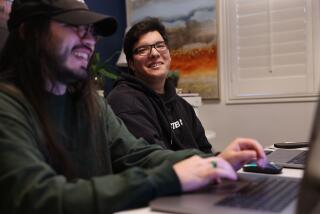Sense of Commitment : Volunteer Came to Help Blind Children and Found Direction for Her Own Life
- Share via
The Foundation for the Junior Blind has offered services and programs to disabled, visually impaired and blind infants, children and adults since 1953. Following the 1992 riots, the foundation joined with community groups to create the First Steps Youth Enrichment program, which employs 22 local youths. First Steps is one of the ways the foundation, at Slauson Avenue and Angeles Vista Boulevard in Southwest Los Angeles, tries to emphasize its commitment to the surrounding community. Camille Henderson, a 17-year-old resident of South-Central, has been with the First Steps program since the beginning. Camille, who plans to attend Hampton College in Virginia this fall, was interviewed by Joy B. Davis.
*
I’ve been with the foundation since last summer, about a year. This summer I’m working from 10 a.m. to 4 p.m., five days a week. I file papers, do typing, make phone calls, answer the phones, whatever they need me to do.
I was asked to be a personal assistant to Lisa Shavers, a social worker. I thought it would be a good opportunity to learn about that field and to see if I was interested in psychology and also to brush up on my clerical skills.
They have made me supervisor over the program for this summer. I do my same duties, but in addition to that I check on the others, make sure they’re doing their duties.
The program has taught me to be my own person and to get a feel for what the work force is like. I’ve gained patience. Whether or not social work is going to be my profession, I still have a sense of responsibility and compassion. You gain more understanding and compassion toward people who are less fortunate than you. You want to help more each day. Once you get used to them, they’re just like you and me. When I see a blind person, I see a regular person.
I was surprised, in a way, that blind people could get along on their own. The equipment that they use, I didn’t know it was as advanced as it is. For instance, there’s the reading machine (the Kurzweil personal reader). It helps the blind students to read their mail or books.
Before the program I had planned to become a child psychologist. This experience makes me realize that this is really what I want to do because I see a need for children to be helped. . . . This is one way that I think it really inspires me.
I like children; I’m a people person. My friends call me the psychologist of the group. I’m always there, giving them advice. I know that’s something I have a talent for. I wouldn’t mind turning that into a profession, that’s why I chose psychology. I would rather work with children over adults because adults, you know, they’ve already lived their lives. If I can do anything to help a child who’s troubled or has any kind of problems, I want to be the one to turn them around.
A summer job is important because it provides responsibility, and you get paid. It’s something productive.
In summers before I started working with the foundation, I would go visit friends, go to the movies, read, just stay at home. This gives me something to do and it’s worthwhile. I’ll miss it. You meet new people your own age and then you share the same interests. If you don’t, you learn to accept the differences in others. It’s a new excuse to make new friends.
I do plan to go back and volunteer at the foundation after college, if not work there. I’ll volunteer in any way possible. What makes this program special is that there is a certain closeness you have with not only the students but with the staff; they take a personal interest in you.
Unfortunately, it took the civil unrest for not only the foundation but a lot of people to open their eyes. It doesn’t matter when (First Steps) got started. The point is that it got started at all. Just go from there.


